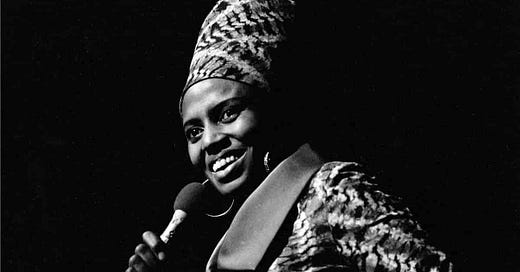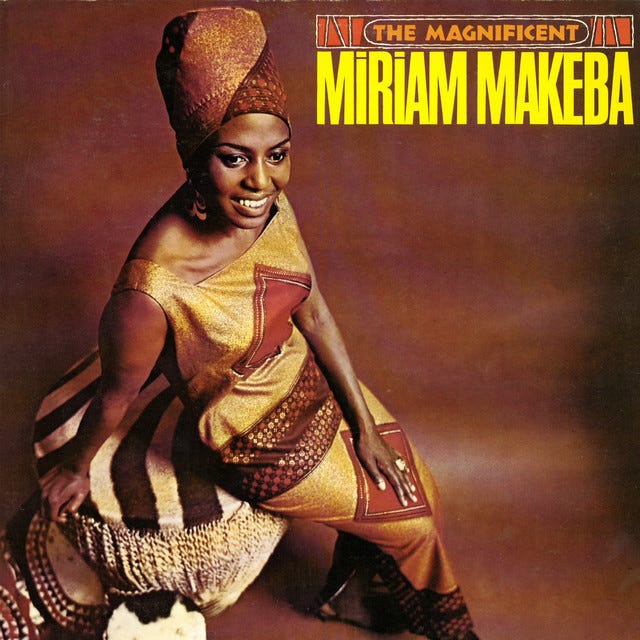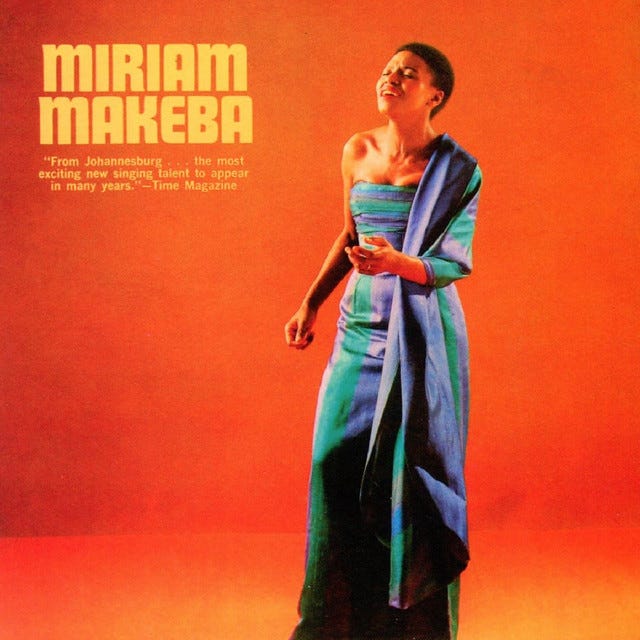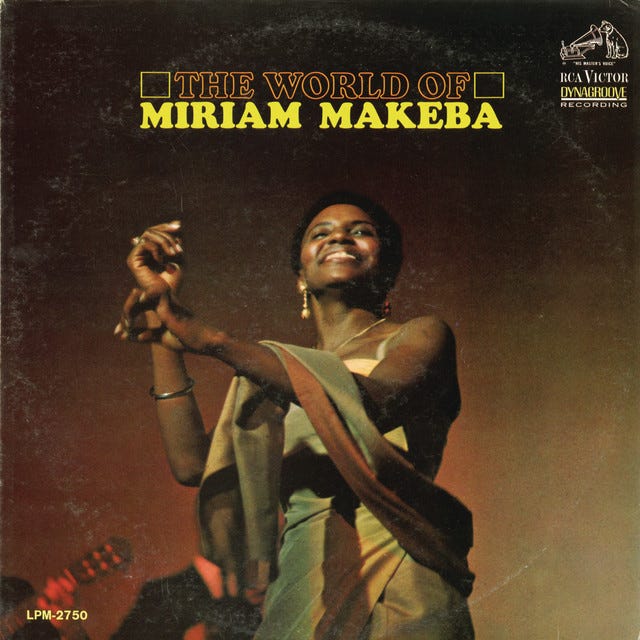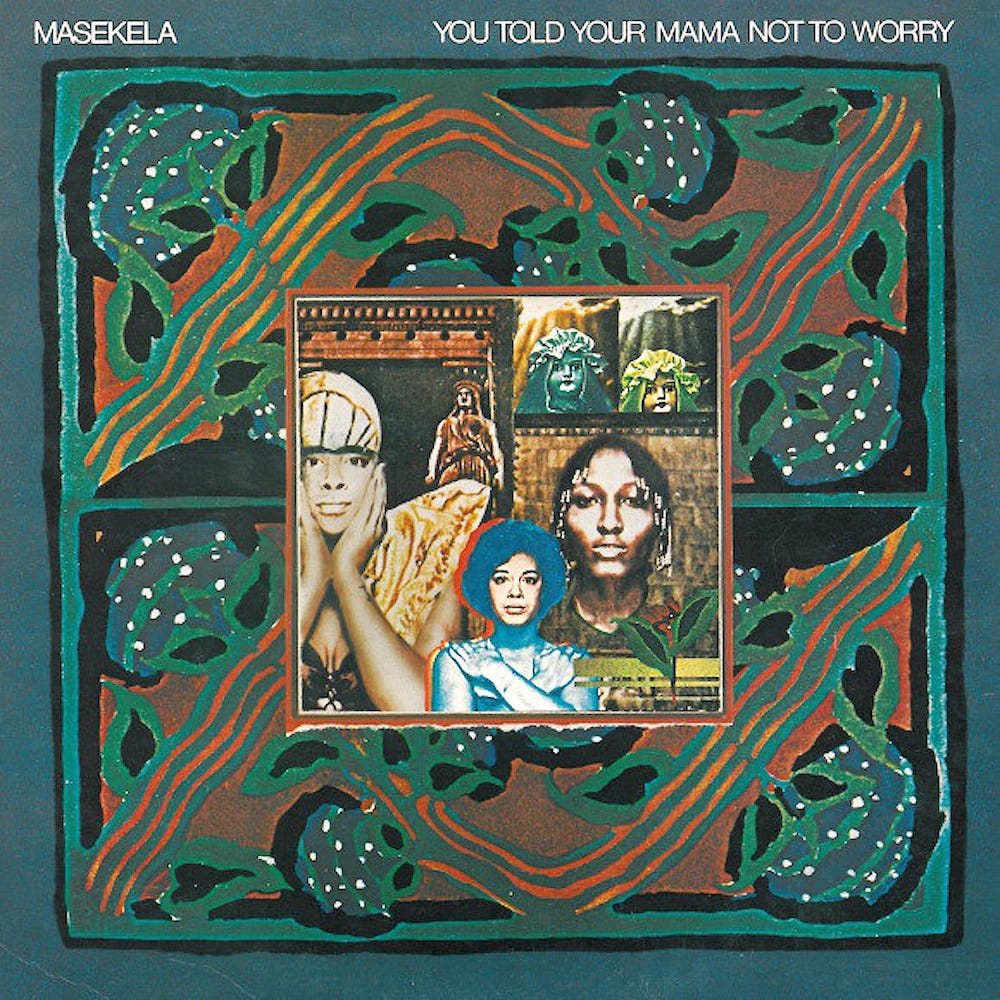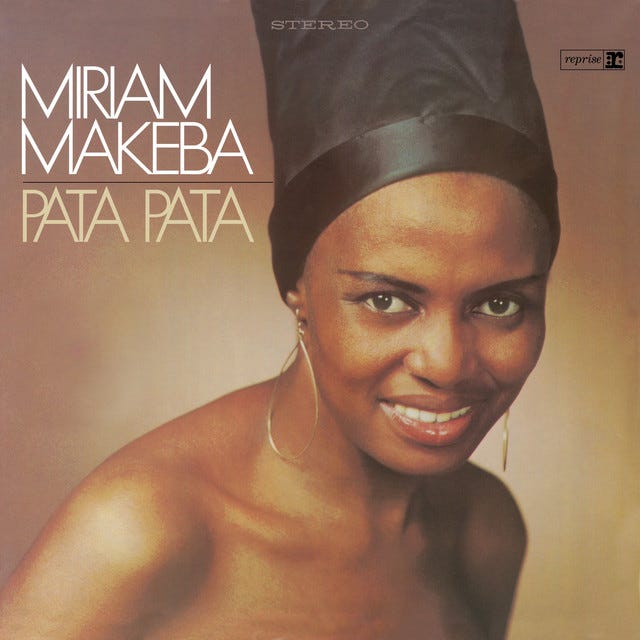“Be careful, think about the effect of what you say. Your words should be constructive, bring people together, not pull them apart.”
Miriam Makeba
Miriam Makeba was one of the most outspoken and political artists of the 20th century. Hailing from South Africa and living from 1932 to 2008, she was - like may contemporaries - a victim of the country’s apartheid regime. Despite the constant oppression, however, she was able to thrive as an extraordinary talented singer, gaining a global audience whilst never backing down from her staunch political beliefs.
Over the course of the next six records, we’ll explore her life and discuss a handful of specific events which shaped her music as well as the history of South Africa. Whilst these events are specific to the time and place they occurred, they are reflected in similar events around the world still to this day and doubtless into the future. Miriam Makeba’s story is still achingly relevant and is in equal measure an inspiration and a warning.
Keep on the good side of history. Don’t support oppressive governments.
The Magnificent Miriam Makeba – Miriam Makeba
Before we dive into the deeply political story of Miriam Makeba’s amazing life, here is a little teaser in the form of my favourite of her lesser-known records. A little something to whet your appetite as we gear up to explore the big story arcs.
Beyond the major hits, there are two songs by Miriam Makeba I find especially excellent. As luck would have it, they are both on the same record! 1966’s The Magnificent Miriam Makeba.
First, Charlie (Oh Mama) is a fabulous example of Makeba’s deft approach to the pure art of singing. Setting aside her importance as a political figure for a moment, this is an exceptional vocal performance. As she meanders her way through a deeply emotional performance, her highs are as piercing as her lows are grounding. Little flourishes and vocal eccentricities like the harsh pronunciation of the name “Charlie” only add to the charm and remind of the superb talent Makeba was. Bringing the politics back for a moment, this is of course a heavy song: A mother decrying the loss of her son, taken by some unnamed power.
The other song I referenced is the rather more famous A Piece of Ground. This, more than any other Makeba song, starkly outlines the political message at its core. Calling out the evils of settler colonialism, land theft, capitalist greed, and white supremacy. There is no ambiguity here, and Makeba’s message is all the more impactful as she presents it with the power and passion of her peerless voice.
Whilst these two songs are particular favourites of mine, the rest of The Magnificent Miriam Makeba very much lives up to its name. This is a beautiful example of Makeba’s ability to sing in English – her fourth language – whilst packing both a political, and emotional punch.
Baby Ntsoare – Manhattan Brothers
Joe Mogotsi, Rufus Khoza, Ronnie Majola Sehume, and Nathan Dambuza Mdledle met at some point in the 1930s during their time at Pimville Government Primary School in the Soweto township of Johannesburg. They started singing together as a closed harmony vocal act. In 1948, they released their first single and fast gained popularity throughout South Africa. It wasn’t an easy ride, however.
You may recognise the year 1948 as the start of apartheid. Institutionalized racial segregation and discrimination enforced by the white minority government for nearly half a century until 1994. As an all-black group, the Manhattan Brothers were consistently oppressed making their pursuit of a career extremely difficult. In 1952, they were invited by the government to perform at the Jan Van Riebeek Tercentenary Festival, an event celebrating 300 years since Dutch colonial forces invaded the country. Of course, they declined (alongside fellow Jazz act the Shantytown Sextet). This resulted in a travel ban, meaning the group were unable to leave the country to perform abroad in spite of their songs having gained a following around the world.
Made up entirely of singles, their whole recorded output makes for excellent listening, but the reason I’ve selected this specific tune, from 1954, is that the B-side – Laku Tschoni ‘Langa is the first ever recording of a young Miriam Makeba who joined the group the year before, aged just 21. You can hear her come in near the end of the track, voice already both gentle and powerful. She left the band in 1958.
In 1961, the group appeared in a very successful musical production of King Kong which was allowed to go on tour to Europe. The cast list also featured Makeba in the lead role as well as a young Hugh Masekela. They were however never allowed to return home, so remained in the UK where they continued playing music until the late 1990s when they were eventually allowed back into South Africa.
Miriam Makeba – Miriam Makeba
Umqombothi is a potent home-brewed South African maize beer. If you get caught brewing it yourself, you may well end up in prison. This is how Miriam Makeba spent the first six months of her life locked up after her mother was caught brewing at home.
Growing up, Makeba enjoyed singing, she joined a church choir where she was found to have a uniquely beautiful voice. She learned to sing in Xhosa, Zulu, and Sotho, and later in English – she reckons she learned to sing English before she could speak it. Growing up in a highly musical family, she was surrounded by live music as well as records from local acts and imports from the US.
As a late teen, after working as a nanny and a launderer, she joined her first band the Cuban Brothers, a closed harmony singing act. Then aged 21, she joined the Manhattan Brothers, a local Vocal Jazz band before leaving to form her own group The Skylarks. In 1959, she appeared briefly in Come Back, Africa, Lionel Rogosin’s semi-fictional documentary about life under apartheid. This brought her to the attention of the American public, including one Harry Belafonte with whom she struck up a close friendship. She relocated to the US where she started her solo career as a singer.
In 1960, she released her debut album, the exquisite eponymous Miriam Makeba. It features her take one Qongqothwane – rebranded ‘The Click Song’ as an English audience couldn’t pronounce the Xhosa name – an early version of Mbube (the original Lion Sleeps Tonight), and a fantastic take on The House of the Rising Sun (some four years before the Animal’s version!)
Sadly, the record initially didn’t do particularly well as the English-speaking audience couldn’t handle vocals in a foreign language. But, over the years, it has become one of her most appreciated albums for its incredible vocal performance, sparse instrumentations, and deep soul.
“Would you keep silent and do nothing if you were in our place? Would you not resist if you were allowed no rights in your own country because the colour of your skin is different to that of the rulers and if you were punished for even asking for equality?”
Mirian Makeba to the UN Special Committee against apartheid in 1962
The World of Miriam Makeba – Miriam Makeba
March 21st, 1960, a large crowd of protesters gathered outside the Sharpeville police station to call out the oppressive pass laws – whereby black South Africans would be required to carry passbooks designed to restrict their movements. It wasn’t long before police opened fire on the peaceful gathering killing 69 people and injuring over 180.
The brutality of this massacre resonated around the world. Miriam Makeba was horrified to hear that two of her uncles had been murdered in the shooting. Up until this opint, Makeba had been a deeply political person but had always avoided any overt messaging. Sharpeville, however, would change this as she found herself compelled to speak on behalf of the oppressed people of her home nation.
In 1962, she appeared before the United Nations imploring the assembled Western leaders to boycott apartheid South Africa and cease arms trades with the country. This resulted her passport being revoked and an official exile, rendering her stateless.
Shortly after this, Makeba released her third full album in 1963. Recorded at New York’s Webster Hall, she is accompanied by an orchestra conducted by Hugh Masekela. This is a Jazzy delight as Makeba’s vocals soar, imbued with pain yet never relinquishing her innate positivity and view for the future. It’s sad but hopeful.
You Told Your Mama Not to Worry - Hugh Masekela
In 1974, the white minority government of South Africa decreed that all education in black schools should henceforth be carried out in Afrikaans, the Dutch descended language rightly considered the tongue of the oppressor. By 16th June 1976, the youth had had enough and in the Soweto township of Johannesburg, they decided to protest. Somewhere up to 20,000 students took to the streets in what would become known as the Soweto Uprising. 1,500 armed police were deployed in response. As violence escalated, the police started shooting straight into the crowd. The final death toll is unknown but certain estimates put it as high as 700, with over 1,000 injured. The official South African government count to this day is 23.
Some 15 years earlier in 1959, two up-and-coming musicians would meet as they were both cast in a Jazz-Opera adaptation of King Kong. Hugh Masekela was hired to play trumpet, Miriam Makeba to perform vocals (she would also be reunited with her old Manhattan Brothers bandmates). These two young musicians fast formed a close bond both creatively and romantically. They would enjoy a brief marriage from 1964 to 1966, but their artistic collaboration would last their entire lifes.
The peak of Makeba and Masekela’s collaborations would come with the potent protest song Soweto Blues. Composed by Masekela and performed by Makeba, it is a bold admonishment of the events described in our opening paragraph. It is a beautiful song and it pulls no punches, following the global Folk tradition of preserving history through the eyes of the people who lived it.
The song first appeared on Masekela’s 1977 album You Told Your Mama Not to Worry - his 20th effort! Soweto Blues is something of an outlier in an otherwise very upbeat and joyous sounding record far more characteristic of Masekela’s vast back catalogue - albeit with very socially engaged lyrics throughout. As ever, Masekela’s idiosyncratic Soul-Jazz trumpet stylings are on full display throughout this masterpiece of a record.
Pata Pata – Miriam Makeba
Pata Pata is without a shadow of a doubt Miriam Makeba’s most successful song. It’s infectious groove and catchy vocals have cemented it as one of the most recognisable songs to come out of South Africa, if not the whole of Africa. It is an irony therefor, that Makeba has described it as her “most insignificant song” in her 1987 autobiography.
Makeba has been singing Pata Pata since the very beginnings of her career, her first recording of the song was in 1956 with her band The Skylarks, although it sounded very different back then, a more Swing Jazz vibe with harmonised vocals; it was even spelled differently as Phatha Phatha. The tune is named after a dance common around Johannesburg shebeens in the 1950s, but the precise origins of the songs re unknow. Similar tunes have been on record all the way back to the 1940s, with versions being sung by different artists. Makeba’s version of the song was based on an instrumental Shumi Ntutu and Isaac Nkosi with additional English lyrics penned by American Jerry Ragovoy. She would record the tune a handful of times throughout her career with the final version coming in 2004 on her penultimate record Reflections. But the most famous interpretation is from the album of the same name released in 1967.
The rest of the album is more in line with Makeba’s back catalogue with political songs sitting side by side with Folk and traditional tunes from South Africa’s various cultures. There is also a reprise of both the Click Song, and A Piece of Ground.
As a radical political activist and victim of governmental oppression throughout her life, the popularity of Pata Pata always baffled Makeba as it was just about a dance, unlike most of her other deeply political songs. However, Makeba put it best herself when she speculated: “Sometimes people are tired of thinking of difficult and unpleasant things.” Indeed, Pata Pata is neither difficult, nor unpleasant, rather, it’s a true classic of modern music!

